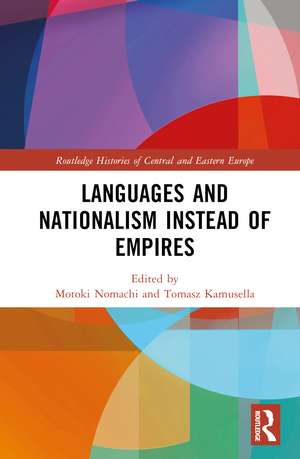Languages and Nationalism Instead of Empires: Routledge Histories of Central and Eastern Europe
Editat de Motoki Nomachi, Tomasz Kamusellaen Limba Engleză Hardback – sep 2023
Through chapters from contributors in North America, Europe, and Asia, the book offers an interdisciplinary introduction to the rise of the ethnolinguistic nation-state during the past century as the sole legitimate model of statehood in today’s Central Europe. The collection’s focus is on the last three decades, namely the postcommunist period, taking into consideration the effects of the recent rise of cyberspace and the resulting radical forms of populism across contemporary Central Europe. It analyzes languages and their uses not as given by history, nature, or deity but as constructs produced, changed, maintained, and abandoned by humans and their groups. In this way, the volume contributes saliently to the store of knowledge on the latest social (sociolinguistic) and political history of the region’s languages, including their functioning in respective national polities and on the internet.
Languages and Nationalism Instead of Empires is a compelling resource for historians, linguists, and political scientists who work on Central and Eastern Europe.
Din seria Routledge Histories of Central and Eastern Europe
-
 Preț: 311.41 lei
Preț: 311.41 lei -
 Preț: 311.90 lei
Preț: 311.90 lei - 8%
 Preț: 382.96 lei
Preț: 382.96 lei -
 Preț: 310.55 lei
Preț: 310.55 lei - 9%
 Preț: 868.44 lei
Preț: 868.44 lei -
 Preț: 311.48 lei
Preț: 311.48 lei -
 Preț: 310.22 lei
Preț: 310.22 lei -
 Preț: 310.84 lei
Preț: 310.84 lei -
 Preț: 310.99 lei
Preț: 310.99 lei -
 Preț: 389.66 lei
Preț: 389.66 lei -
 Preț: 310.22 lei
Preț: 310.22 lei -
 Preț: 310.84 lei
Preț: 310.84 lei -
 Preț: 163.03 lei
Preț: 163.03 lei - 18%
 Preț: 1000.27 lei
Preț: 1000.27 lei -
 Preț: 309.79 lei
Preț: 309.79 lei - 16%
 Preț: 264.98 lei
Preț: 264.98 lei - 18%
 Preț: 1006.77 lei
Preț: 1006.77 lei -
 Preț: 385.47 lei
Preț: 385.47 lei - 18%
 Preț: 1001.39 lei
Preț: 1001.39 lei - 18%
 Preț: 1000.27 lei
Preț: 1000.27 lei - 18%
 Preț: 887.43 lei
Preț: 887.43 lei -
 Preț: 387.49 lei
Preț: 387.49 lei - 18%
 Preț: 1001.90 lei
Preț: 1001.90 lei -
 Preț: 389.66 lei
Preț: 389.66 lei - 18%
 Preț: 1006.43 lei
Preț: 1006.43 lei - 18%
 Preț: 1109.18 lei
Preț: 1109.18 lei - 19%
 Preț: 269.84 lei
Preț: 269.84 lei -
 Preț: 311.41 lei
Preț: 311.41 lei - 18%
 Preț: 1003.30 lei
Preț: 1003.30 lei - 18%
 Preț: 1000.27 lei
Preț: 1000.27 lei - 18%
 Preț: 1006.77 lei
Preț: 1006.77 lei - 17%
 Preț: 259.72 lei
Preț: 259.72 lei -
 Preț: 391.02 lei
Preț: 391.02 lei
Preț: 1000.27 lei
Preț vechi: 1219.84 lei
-18% Nou
Puncte Express: 1500
Preț estimativ în valută:
191.41€ • 200.76$ • 159.34£
191.41€ • 200.76$ • 159.34£
Carte tipărită la comandă
Livrare economică 01-15 aprilie
Preluare comenzi: 021 569.72.76
Specificații
ISBN-13: 9780367471910
ISBN-10: 0367471914
Pagini: 284
Ilustrații: 8 Tables, black and white; 15 Line drawings, black and white; 17 Halftones, black and white; 32 Illustrations, black and white
Dimensiuni: 156 x 234 x 18 mm
Greutate: 0.45 kg
Ediția:1
Editura: Taylor & Francis
Colecția Routledge
Seria Routledge Histories of Central and Eastern Europe
Locul publicării:Oxford, United Kingdom
ISBN-10: 0367471914
Pagini: 284
Ilustrații: 8 Tables, black and white; 15 Line drawings, black and white; 17 Halftones, black and white; 32 Illustrations, black and white
Dimensiuni: 156 x 234 x 18 mm
Greutate: 0.45 kg
Ediția:1
Editura: Taylor & Francis
Colecția Routledge
Seria Routledge Histories of Central and Eastern Europe
Locul publicării:Oxford, United Kingdom
Public țintă
PostgraduateCuprins
Introduction 1. Language or Dialect? Nation-Building in Central Europe 2. Language and Place in Recent Eastern European Linguistic Regionalism Part 1: State Languages 3. The Russian Standard Language from the Empire Through the Revolution and Stalinism to Perestroika 4. Attitudes to Linguistic Accuracy among Russian-Speaking Social Media Users 5. Rethinking the Graphization Process of the Belarusian Language in Eastern and Western Belarus During the Interwar Period 6. Urban Oral Ukrainian of the 1920s as Reflected in Early Soviet Literature 7. Democratizing Linguistic Forms: Language Regulation and Diachronic Shifts in Czech 8. Script Revitalization? Reemergence of Old Scripts Among South Slavs 9. Ideology Against Language: The Current Situation in South Slavic Countries 10. Change and Variation in the Bulgarian Language of Internet and Social Media Part 2: Substate Languages 11. The Latvian (In)Dependence and the Latgalian Language Question 12. Silesian: Between Suppression in Poland and Flourishing on the Web 13. Codification of Vojvodina Rusyn: Language Ideology in Kosteljnik's Grammar of 1923 14. Standardizing Vlach Romanian in Eastern Serbia: A Remissive Issue
Notă biografică
Motoki Nomachi is Professor in the Slavic-Eurasian Research Center at Hokkaido University, Japan. He researches Slavic language contact and linguistic typology, alongside the Slavic micro-languages. Recently, he wrote and edited Slavic on the Language Map of Europe: Historical and Areal-Typological Dimensions (2019).
Tomasz Kamusella is Reader in Modern History at the University of St Andrews, Scotland, UK. His latest publications include Politics and the Slavic Languages (2021) and Words in Space and Time: A Historical Atlas of Language Politics in Modern Central Europe (2021).
Tomasz Kamusella is Reader in Modern History at the University of St Andrews, Scotland, UK. His latest publications include Politics and the Slavic Languages (2021) and Words in Space and Time: A Historical Atlas of Language Politics in Modern Central Europe (2021).
Descriere
This volume probes into the mechanisms of how languages are created, legitimized, maintained, or destroyed in the service of the extant nation-states across Central Europe.
